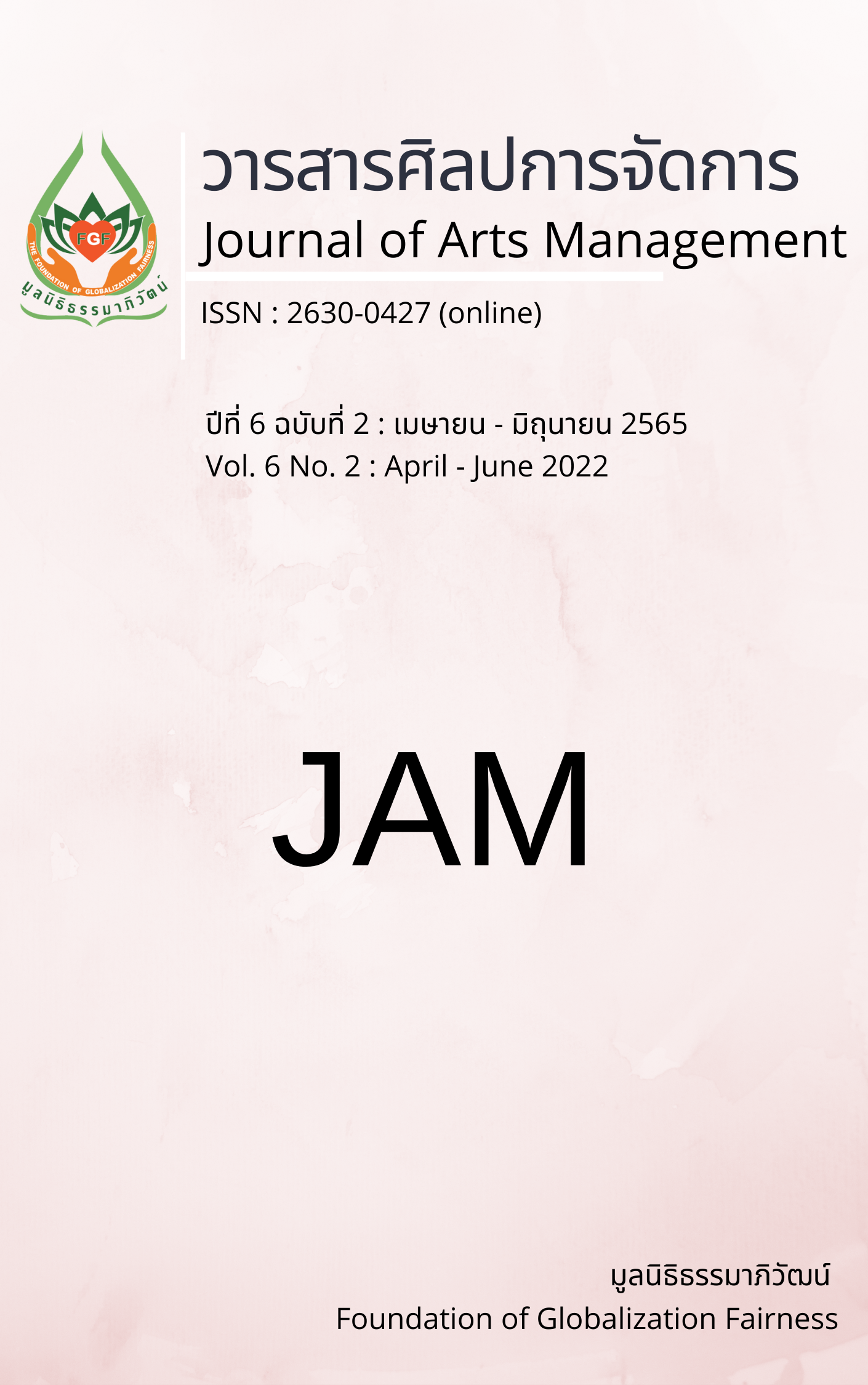Factors Influencing to Purchase Intention of Organic Food Consumer in Thailand
Main Article Content
Abstract
This article aimed to 1)develop a causal relationship model on the influence of health consciousness, value recognition, and purchase intentions of organic food consumers in Thailand; 2) analyze the direct influence of health consciousness and perceived value that affects the intention to buy organic food; and 3) analyze the indirect influence of health consciousness and perceived value that affects the intention to buy organic food through the interstitial variables on attitudes towards organic food consumption behavior. Using a quantitative research model, the population was organic food consumers in Thailand aged 15-59 years who buy organic food. A multistage sampling method was used with 541 sample respondents. The analysis of structural equation modelling.
The results of the structural equation and path analysis showed that the developed model was consistent with the empirical data. The model conformance index value was CMIN/DF=1.524, CFI=0.993, TLI=0.988, GFI 0.973, NFI=0.980, RMSEA=0.031, RMR=0.018, p=0.02; 2) The results of the analysis were that health consciousness, attitude toward behavior, and subjective norm had a positive direct effect influence to purchase intention statistically acceptable 0.01. Perceived value had a direct influence on organic food purchase intentions but was statistically unacceptable; 3) Health consciousness had a direct influence on attitude toward behavior but was statistically unacceptable, and perceived value had a positive direct effect influence to attitude toward behavior statistically acceptable 0.01; and 4) Health consciousness had an indirect influence on organic food purchase intentions but was statistically unacceptable and perceived value has positive indirect effect on purchase intention through the interstitial variables on attitudes towards organic food consumption behavior that was statistically acceptable 0.01.
Article Details

This work is licensed under a Creative Commons Attribution-NonCommercial-NoDerivatives 4.0 International License.
Views and opinions appearing in articles in the Journal of Arts of Management It is the responsibility of the author of the article. and does not constitute the view and responsibility of the editorial team I agree that the article is copyright of the Arts and Management Journal.
References
Ajzen, I. (1991). The Theory of Planned Behavior. Organizational Behavior and Human Decision Process, 50(2), 179-211.
Anupam, S., & Priyanka, V. (2017). Factors influencing Indian consumers’ actual buying behavior towards organic food products. Journal of Cleaner Production, 167, 473- 483. https://doi.org/10.1016/j.jclepro.2017.08.106
Bandura, A. (1997). Self-efficacy: The exercise of control. W.H. Freeman and Company.
Becker, M. H., Maiman, L. A., Kirscht, J. P., Haefner, D. P., & Dracman, R. H. (1977). The health belief model and prediction of dietary compliance: A field experiment. Journal of Health and Social Behavior, 348–366.
Breckler, S. W. (1986). Attitude, structure and function. Lawrence Eribaum Association.
Chiew, S, W., Khalid, I., & Nawawi, I. (2014). Consumer perception, purchase intention, and actual purchase behavior of organic food product. Review of Integrative Business & Economics Research, 3(2), 378–397.
Cristina, F., Smaranda, A. C., & Vlad, B. (2020). Values and planned behaviour of the Romanian organic food consumer. Sustainability, 12(5), 1722. https://doi.org/10.3390/su12051722
Deonir, T., Luciene, E., Fabiano, L., & Gabriel, S. M. (2017). Antecedents of perceived value and repurchase intention of organic food. Journal of Food Products Marketing, 24(4), 456-475. https://doi.org/10.1080/10454446.2017.1314231
Ezlika. G., Pat C. S., Dilip S. M., & Bang. N. (2017). Health and cosmetics: Investigation consumer’s values for buying organic personal care products. Journal of Retailing and Consumer Services, 39(C), 154-163. https://doi.org/10.1016/j.jretconser.2017.08.002
Hair, J, F., Black, W, C., Babin, B, J., & Anderson, R, E. (2010). Multivariate data analysis (7th ed.). Pearson Prentice Hall.
Jabori, S. A., Bilal, E., & Anas, S. A. (2019). Environmental concern, health consciousness and purchase intention of green products: An application of extended theory of planned behavior. The Journal of Social Sciences Research, 5(4), 868-880. https://doi.org/10.32861/jssr.54. 1203.1215.
Jillian, C. S., & Geoffrey, N. S. (2001). Consumer perceived value: The development of a multiple item scale. Journal of Retailing, 77, 203-220.
Jump, N. (1978). Psychometric theory (2nd ed.). McGrow Hill.
Kumar, A., & Smith, S. (2017). Understanding local food consumer: Theory of planned behavior and segmentation approach. Journal of Food Products Marketing, 24(2), 196-215. https://doi.org/10.1080/10454446.2017.1266553.
Kusumaningsih, D., Irianto, H., & Antriyandarti, E. (2019). Effects of health consciousness and environmental attitude on intention towards organic food purchase. Materials Science and Engineering, 633. https://10.1088/1757-899X/633/1/012052.
Iacobucci, D., & Duhachek, A. (2003). Advancing alpha: Measuring reliability with confidence. Journal of Consumer Phycology, 13(14), 478-487.
Marwa, G. M., & Scott, D. (2013). An extension of the benefit segmentation base for the consumption of organic food a time perspective. Journal of Marketing Management, 29(15-16), 1701-1728. https://doi.org/10.1080/0267257X.2013.800896.
Ministry of Public Health. (2017). The 20-year National Strategic Plan on Public Health (2017-2036). Ministry of Public Health.
Office of Small and Medium Enterprises Promotion. (2020). Executive summary report on the situation of SMEs in 2020. Retrieved from https://www.sme.go.th/upload/mod_download /download-20200824164414.pdf.
Rogers, R. W. (1975). Protection motivation of fear appeals and attitude change. The Journal of Psychology, 91, 93-114.
Schumacher, R, G., & Lomax, R, G. (2010). Beginner’s guide to structural equation modeling (3rd ed.). Routledge.
Hsu, S.Y., Chang, C.C., & Lin, T.T. (2016). An analysis of purchase intention toward organic food on health consciousness and food safety with/under structural equation modeling. British Food Journal, 118(1), 200-216.
Song, B. L., & Shaheen, M. (2016). The effects of marketing stimuli factors on consumers’ perceived value and purchase of organic food in Malaysia. Journal Pengurusan, 47, 119-130. https://doi.org/10.17576/pengurusan-2016-47-10.
Tran, N. T., & Tran, T. V. (2016). An exploration in the theory of planned behavior: A case of organic food in Vietnam. IJABER, 14(6), 4951-4972.


